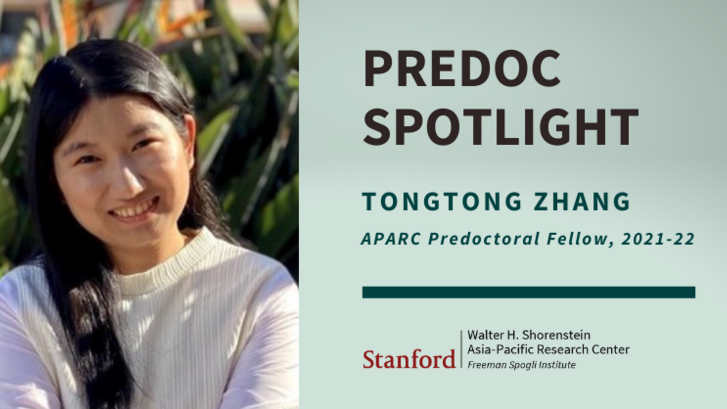Research Assistant Spotlight: Kerstin Norris Examines Race and Racism in Asia with Gi-Wook Shin
Research Assistant Spotlight: Kerstin Norris Examines Race and Racism in Asia with Gi-Wook Shin
MA in East Asian Studies candidate Kerstin Norris spent the summer assisting APARC and Korea Program Director Gi-Wook Shin with his research on racial tensions in Asia. Looking to pursue a PhD in Sociology, Norris found tremendous value in a collaborative academic environment. We spoke with Norris about her experience as a research assistant and her time working with Dr. Shin.

Each summer, Stanford students assist APARC faculty on a variety of projects as research assistants (RAs). For Master’s in East Asian Studies candidate Kerstin Norris, working with Center and Korea Program Director Gi-Wook Shin provided the opportunity to conduct literature reviews of the field of race studies and build her skills in a collaborative research environment.
Norris, who intends to pursue a doctoral degree in Sociology with a research emphasis on Korean Studies, described the experience of working closely with Stanford faculty and peer researchers as particularly valuable in designing her own research projects and giving her direction for her future dissertation.
In the following Q&A, Norris discusses her research assistantship experience this summer. The interview was slightly edited for length and clarity.
Sign up for APARC newsletters to receive research and commentary updates from our scholars
First, tell us a bit about yourself and your academic interests and extracurriculars.
I am currently a master’s student within the Center for East Asian Studies and primarily focus on South Korea, militarism, labor, and migration. I am originally from Xenia, Ohio where not much happens. So, when I told my family I was interested in international studies as an undergraduate and later East Asia as a graduate student, I was always the odd man out. I knew that I was meant to leave my small town but was unsure what I was destined to do. At the Ohio State University, I found a love for international relations, political theory, and research with an interest in East Asia (I have Korean and Japanese pop and rock music to thank for that). I decided to apply to Stanford’s East Asian Studies master’s as a bridge for a PhD in Sociology in order to gain more knowledge.
Why did you choose to work with Dr. Shin?
I actually chose to attend Stanford in order to work with Dr. Shin. His work is globally renowned in East Asian studies and especially Korean studies. Before committing to Stanford, I had a Zoom call with Dr. Shin about the CEAS program and the university’s opportunities. I knew I wanted to become an academic, but the incredible competitiveness in the job market always made me apprehensive to go forward with that career route. The uncertainty about job prospects after graduation felt daunting, although I could not imagine doing anything else, given my love for teaching and research. However, after my call with Dr. Shin, I knew I had to give it a shot. He told me that it was possible for me to become a scholar if I wanted to and had the grit. He really inspired me, so it was natural for me to want to work under Dr. Shin as an RA.
Can you describe the research assistantship?
Because we were in the beginning stages of a project, the job consisted primarily of conducting literature reviews of the field of race studies and searching for case studies for the job. After completing the literature reviews, my teammates and I had biweekly meetings in which we discussed the content we read and attempted to theorize our own understanding of race and racism within the Asian context. The next team will be doing far more empirical work and working closely with case studies. To those unfamiliar with academia, I might describe this research as an attempt to gain a greater understanding of how racism operates in an Asian context. A lot of scholarship concerning what race is and how it operates within the world is very Western-centric or applies a Black-White lens, so it is important to understand how it potentially manifests across the Asian continent.
What did you learn over the course of your research assistantship and how do you think it will help you in your career?
Given that I want to be a professor in Sociology and Korean studies, this research directly correlated to my future career. I had been an RA in the past, largely doing archival research and general literature reviews. However, this RA-ship was different in that it really challenged me to work within a team, become more familiar with a field I hadn’t studied, and build a project from ground zero. Because of the RA-ship, I will be better prepared to design my own research projects, most importantly my future dissertation.
What's next for you?
In the fall, I will be doing an exchange quarter at Sungkyunkwan University where I will be taking Korean studies courses taught in Korean. I will then return to Stanford to write my master’s thesis and graduate. Hopefully, I will then apply to PhD programs!
Any advice for Stanford students considering a summer RA position?
For those considering a summer RA position, I would make sure that the research interests you and somewhat aligns with something you’d like to do in the future, even if it isn’t academia. I would also highly recommend working in an RA position with a team. Having done research alone and in a team setting, I recognize how much I gained from hearing others’ thoughts and debating concepts and theories. That was the most fruitful part of my summer experience.



